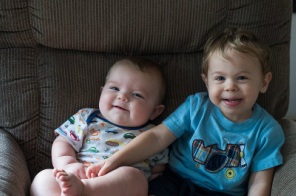Because firstborns are the center of Mom's and Dad's universe, their intelligence is stimulated and they have higher IQs which, in turn, enhances school success resulting in higher incomes. They are likely to pursue more intellectual careers and earn about $100,000 more annually than their siblings. Their success comes with a price.
They lean toward Type A personalities. They drive themselves mercilessly because of their intense fear of failure. Firstborns are inflexible, don't cut themselves much slack, are intensely well-organized and they stick to the "straight and narrow". They are leaders. Fully half of all Nobel Prize winners and presidents have been firstborns. John Lennon, Oprah Winfrey, Bill Cosby and Hillary Clinton are firstborns.
I like to refer to firstborns as the "experimental" children because parents are novices at being parents. Yes, by the time the next kid comes along, parents are more confident, but because each child is different with varying needs and personality styles, each child ends up being "experimental" as parents play "catch up" refining their approaches. Three kids mean three different parenting approaches and subsequently, even more creative strategies to address the interactions between the kids. Wonder why you're exhausted???
Firstborns receive a steady stream of encouragement for their every accomplishment. Teach them that it's OK to fail and that mistakes are for learning.
Jeff is that middle child who take trips with other families and has more sleep-overs at the homes of his friends. He doesn't think he'll be missed! He is aware of his "place" in the family and "makes the best of it".
Professions associated with the middle child typically require "people skills" which lead them to nursing, law enforcement and other professional service fields. They earn $40,000 or less per year than their older and younger sibs.
To offset their birth position, empower and celebrate them a bit more. They don't need much! And, just because Jeff is a middle child, don't think his fate is set in stone. Abraham Lincoln, David Letterman, Jennifer Lopez, Bill Gates and Britney Spears are all "middles"! Again, they defied the birth order theory.
Lastborns have social personalities and are agreeable. Susan is the lastborn and she has to learn to "float along" like the middle kids. She, like other "final kids" is free-spirited, unconventional, is a physical risk-takers and adventurous. Just when parents are exhausted from the first two children, they get a "wild thing" like Susan for the third!
The lastborns suffer, though. She might question her worth. Because Mom and Dad have "seen it already", the accomplishments of the lastborns are not celebrated or seem original and parents do not react with as much enthusiasm and genuine pleasure as they did with the firstborn.
Because parents are busy with so many other family responsibilities, Susan is likely to be the least disciplined and the least self-disciplined. The standards for her seem to be lower and she knows it. Her role as "the baby" might give her permission to manipulate others and "skate" by.
Don't let Susan get away with this! Be aware of this tendency for her not carry her own weight and focus on personal responsibility.
Because they are artistic and creative, lastborns gravitate toward jobs in sales, marketing and advertising as well as the performance arts. They earn the least of their siblings, but enjoy being "part of the show".
Lastborns may become dependent adults who are unprepared for the world, but that is not the case with Eddie Murphy, Billy Crystal, Jim Carrey, Halle Berry or Margaret Thatcher. Looks as though the birth order "rules" didn't apply to them!
So, what about twins? Even though the first child to be born is the "first" by only a few minutes, they have the characteristics of a firstborn and the 2nd born acts younger.
If there is a 5-year gap between one child and another, it's as if the birth order dynamics "start over". So, if Joey is 5 and his sister is 11, he'll have the characteristics of a firstborn.
If Susie is the first girl even though she's the third child, she is likely to demonstrate traits of a firstborn. If Sam is the 4th child, but is the first son, he is likely to behave like a firstborn.
There are so many factors that go into making up a child's personality, their school performance, their career choice and their ultimate success in life. Birth order is just one and it may turn out that it doesn't matter at all. Perhaps, in the future, scientific-based research will either confirm or deny this whole concept of birth order that Austrian psychiatrist, Alfred Alder, posed way back in 1908.
Think about the birth order of your family members. Does your older sister "fit" the firstborn profile? What about you? Your younger twin brothers, perhaps?
Although the concepts presented here aren't research-based, there's likely to be a bit of real-life truth in here somewhere. It's empirical evidence...based on observation. It's important to know "what has been observed in others" in order to minimize the "unintended consequences". I like to think of it as "controlling the controllable". There's so much that's out of our control that it's nice to think we can have a bit of power in shaping our children's lives by understanding more of their experiences.
Have fun! Claudia
Join me on Facebook at Dr. Claudia McCulloch
At drclaudia.net, click on the "Ask Me" button to submit a question.






